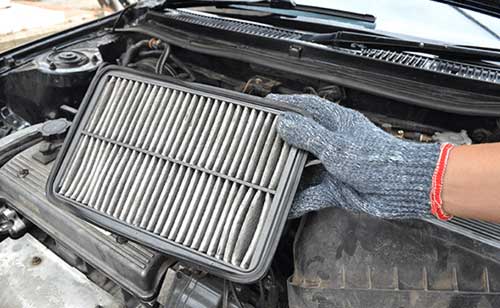Understanding the role of car air filters helps owners to keep their vehicles running smoothly. These filters trap dirt, dust, and other pollutants before they can enter the engine. A clean air supply is essential for optimal fuel combustion, which directly affects engine efficiency and power.
Without a functional air filter, engines can suffer from increased wear and tear, leading to costly repairs or reduced lifespan. Proper maintenance of air filters is a relatively simple yet effective way to enhance engine performance, ensure fuel efficiency, and reduce emissions.
Regular replacement of air filters is an affordable way to protect the intricate mechanics of a car’s engine and maintain overall vehicle health. It’s a small component that makes a significant difference in the longevity and reliability of your car.
Why Air Filters Matter
Air filters play a critical role in maintaining engine performance by ensuring that clean air flows into the engine. A clogged or dirty air filter can reduce airflow and alter the air-fuel mixture, which can lead to engine sputtering and lack of power. Regular replacement of air filters protects vital engine components from premature wear.
The impact of air filters on fuel efficiency is often underestimated. Through optimal engine breathing facilitated by a clean filter, fuel combustion becomes more efficient, resulting in improved mileage. This makes regular maintenance a key factor in reducing fuel consumption.
Prevention of contaminants is yet another indispensable benefit of air filters. They prevent harmful debris, dust, and other particulates from entering the engine, thereby safeguarding internal mechanisms. A well-functioning air filter is essential for prolonging engine life and ensuring consistent vehicle performance.
How Important Are Air Filters In Cars
Air filters in cars play a pivotal role in maintaining engine longevity. Their ability to trap dirt, dust, and debris prevents such particles from entering the engine, which could lead to premature wear and tear. Clean air filters ensure that engines operate at optimal efficiency, significantly extending the life of car components.
The impact of air filters on air quality inside a vehicle cannot be underestimated. A clogged or dirty air filter can lead to poor cabin air quality, exposing passengers to potential respiratory issues and allergens. Maintaining a clean air filter enhances the air quality, ensuring a healthier and more pleasant driving experience.
Overall vehicle health is also closely tied to the condition of the air filter. Optimal airflow is crucial for the car’s performance and fuel efficiency. An obstructed air filter can strain the engine, increase fuel consumption, and lead to an increase in harmful emissions.
Regular checks and replacements of air filters are essential for the sustainable performance and reduction of environmental impact of your vehicle.
Maintenance And Replacement
Air filters play a crucial role in ensuring that a car’s engine is free from contaminants and debris. A clogged or dirty air filter can significantly impact performance and fuel efficiency. To maintain your vehicle’s health, it’s essential to recognize the signs that indicate a need for a filter change.
These signs include reduced horsepower, unusual engine sounds, or a decrease in gas mileage.
Car owners should adhere to the recommended replacement intervals, which typically range from every 15,000 to 30,000 miles, depending on the vehicle’s make and model. However, driving in dusty or polluted environments might necessitate more frequent changes.
Deciding between DIY or professional replacement hinges on personal confidence and expertise. Replacing an air filter is generally a straightforward task, and many car owners opt to do it themselves.
Nonetheless, those who are not comfortable performing car maintenance should seek professional assistance to ensure the job is done correctly.
Common Myths About Car Air Filters
Debunking Filter Longevity Misconceptions often leads car owners to believe that their air filters need less frequent replacement than recommended. Contrary to this belief, regular maintenance is paramount to ensure the efficiency of the vehicle’s HVAC system and engine performance.
Air filters that are not changed at proper intervals can result in reduced air flow and higher fuel consumption, as the engine struggles to draw air through a dirty filter.
Clarifying Washable vs. Disposable Filters is crucial for making informed decisions on air filter maintenance. Washable air filters provide a reusable option, which must be cleaned and oiled correctly for optimal performance. Disposable filters, designed for single use, are convenient and often chosen for their effectiveness in trapping particulates without the need for cleaning.
Realities of Performance Air Filters reveal that while they may offer increased airflow, this doesn’t guarantee a notable increase in engine power. It is vital to consider that these filters must still be maintained properly, and the vehicle’s overall condition plays a critical role in realizing any potential performance benefits.
The Future Of Air Filtration In Cars
The importance of air filters in cars cannot be overstated, with technology playing a pivotal role in their evolution. Modern filtration systems are at the forefront, leveraging cutting-edge advancements to enhance vehicle performance and cabin air purity.
Innovative technologies such as activated carbon layers and electrostatically charged filters are vastly improving the trapping of contaminants, odors, and allergens.
Material and design improvements also pose significant strides in filter efficiency and longevity. The use of advanced synthetic fibers, for example, offers greater durability and filtering capabilities compared to traditional paper-based elements.
Coupled with aerodynamic designs, these filters reduce energy consumption and contribute to an increase in the overall efficiency of the vehicle.
Environmental factors play a crucial role, with stringent regulations driving the development of eco-friendly filter solutions. These regulations push manufacturers to adopt practices that minimize the environmental impact, leading to the production of filters that are not only highly effective but also more sustainable and recyclable.

Credit: www.championautoparts.com
Conclusion
Air filters stand as unsung heroes in vehicle maintenance. They safeguard engines and enhance air quality, proving their worth daily. Regular filter checks and timely replacements will keep your car running smoothly, ensuring both performance and longevity. Don’t overlook this vital component; it’s central to a healthier, high-functioning car.
